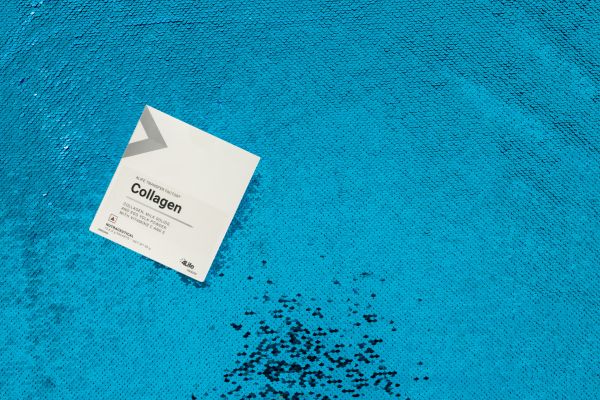Are you sure you want to leave Alexander's MyShop site?
Are you sure you want to leave Alexander's MyShop site?
Are you sure you want to leave Alexander's MyShop site?
Are you sure you want to leave Alexander's MyShop site?
Curious whether collagen is good for men? You’re not alone. Collagen often makes headlines in beauty circles, but it’s also gaining traction among men seeking joint support, muscle recovery, and healthy skin. This guide unpacks exactly what collagen is, the science behind its benefits for men, and practical ways to make it part of your daily routine.
Collagen is the most abundant protein in the human body. It acts as a primary building block for connective tissue, forming the foundation for skin, bones, muscles, tendons, and ligaments.1 Think of collagen as the body's internal scaffolding. This protein provides strength, flexibility, and integrity to nearly every part of your body.
Your body naturally produces collagen, but production slows as you age, typically beginning in your mid-twenties. This decline can lead to visible signs of aging, joint discomfort, and slower recovery from injuries.2 That’s why collagen supplements have become popular not just for women, but increasingly for men who are invested in maintaining an active, resilient body.
Collagen is a vital protein composed of amino acids, primarily glycine, proline, and hydroxyproline. These amino acids combine to form unique triple-helix structures, giving collagen its remarkable strength and flexibility, making it unlike any other protein in the body.3 Collagen serves as a foundational building block for several tissues, contributing to their structure, resilience, and overall function.
There are multiple types of collagen, but Types I, II, and III are the most significant when it comes to maintaining overall health and well-being.
Collagen plays numerous roles in the body, including:
Understanding how your body uses collagen highlights its importance in maintaining health and vitality. Whether you get collagen in your diet or through supplements, ensuring your body has enough collagen can help you age gracefully, stay active, and support your overall physical well-being.
Many men wonder if collagen is right for them, and they are often hesitant to try it due to its association with skin and beauty. However, collagen offers some compelling benefits worth exploring.
Men who prioritize an active lifestyle often put extra strain on their joints. Collagen supplementation can help support cartilage and joint health. One study in the journal Current Medical Research and Opinion found that athletes taking collagen hydrolysate experienced less joint discomfort during activity compared to a placebo group.4
After intense workouts or physical labor, collagen helps repair microtears in muscle fibers. Collagen is rich in amino acids, which supports lean muscle mass and post-exercise recovery. A study from the British Journal of Nutrition indicated that men who took collagen peptides in conjunction with strength training saw greater increases in muscle mass than those who did not supplement.5
While skincare is often marketed toward women, men also benefit from collagen’s effects on skin elasticity and hydration. Collagen supports a firm and youthful appearance, and it may help minimize the fine lines and dryness that come with age. Research published in Skin Pharmacology and Physiology found consistent improvements in skin elasticity after eight weeks of collagen supplementation.6
Collagen provides structure for strong bones. Men over forty face an increased risk of bone density loss, making collagen especially relevant with age.7 There’s also evidence to suggest that collagen may contribute to healthier arteries, though more research is needed in this area.8
Collagen supports satiety and may reduce feelings of hunger. Some studies suggest that collagen can help support the lining of the digestive tract, though this benefit is still under investigation.9

Despite the upsurge in interest, myths and skepticism persist about collagen. Let’s break down a few common myths:
Fact: Collagen benefits men and women of all ages, particularly for joint function, muscle recovery, and bone health. It is not a “beauty-only” supplement.
Fact: While a balanced diet is crucial, collagen’s unique amino acid composition (especially glycine and proline) isn’t present in high amounts in many common protein sources. Collagen’s specific benefits come from these amino acids.
Fact: Collagen comes in various forms, including hydrolyzed (for easy absorption), gelatin, and undenatured collagen. Hydrolyzed collagen peptides are typically best for dietary supplementation due to their superior absorption.
Research shows that collagen offers significant benefits for men, including joint health, muscle building and repair, and skin elasticity and hydration.10 Studies suggest that regular collagen supplementation can support recovery, support lean muscle, and support skin health.
Adding more collagen to your diet doesn’t have to be complicated. Here are some easy, actionable steps:
Collagen supplements are available in various forms, including powders, capsules, and ready-to-drink options, and they come in a range of flavors. Whether you mix them into your morning coffee or smoothie or just take them on their own, collagen supplements are an easy addition to your daily routine for a healthy start to your day.
Most studies use between 10 and 20 grams of collagen daily. Start on the lower end and adjust as needed.
Collagen works best as part of a varied, nutrient-rich diet. While supplements can be helpful, it’s also important to incorporate whole foods that support collagen production, such as bone broth, fish, eggs, and fruits and vegetables high in vitamin C. Additionally, ensure you’re getting enough zinc and copper, as these nutrients help your body create new collagen.
For the best results, take collagen daily. Some men notice benefits, like healthier skin or joint support, after four to eight weeks. However, it may take longer to see benefits, so keep a consistent routine to see the full benefits of collagen.
There are many forms of collagen supplements available, including powders, capsules, and even gummies. Experiment with different types and brands to find what works best for you and your lifestyle. Remember to always check the ingredients list and choose high-quality products.
Collagen needs water to function properly in the body. Make sure you’re well-hydrated and drink enough water throughout the day. This will not only help with collagen production but also improve overall health.
Sleep is crucial for the body's natural healing processes, including collagen production. Aim for 7-9 hours of quality sleep each night to give your body the rest it needs.
Collagen supplements offer clear benefits for men, ranging from joint support to muscle repair and healthier skin. These advantages are backed by clinical studies and years of research.
Adding collagen to your routine is simple, cost-effective, and requires only a few minutes a day. To get started, choose a high-quality hydrolyzed collagen supplement and combine it with a balanced diet and regular exercise. Your body will thank you, both today and in the years to come.

You are trying to view a MyShop page. Please log out in order to view this website.